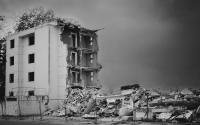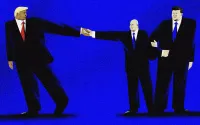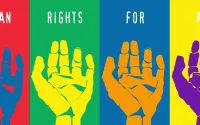3 December 2005Mark Weisbrot and Larry Birns
The decision of four opposition parties in Venezuela to withdraw from elections this weekend raises important questions for the media. It is clear to anyone familiar with the situation that this is an attempt to discredit the election, by parties that (according to opposition polling) were indisputably expected to do very badly in the election. This is despite their control over the majority of the broadcast and print media in Venezuela, as well as most of the country's national income and wealth.
Yet much of the international press coverage would convince the general reader, who is not familiar with the details of the situation, that these parties may have a case for their claim that the ballot couldn't be trusted. In this coverage it appears to be a matter of opinion, despite a strong statement to the contrary from the OAS, which is observing the election. (See below). As of this morning, almost none of the English-language press had reported the OAS comments, although they were reported in Spanish-language newspapers such as Clarin in Argentina.
It is clear that the opposition's attempt to discredit these elections will be joined by powerful figures in the United States, including some Members of Congress and - possibly, depending on how the media covers these events - the White House and State Department.
It is worth noting that most of these same opposition parties, and also Súmate (an opposition group that co-ordinated the August 2004 attempt to recall President Chavez), refused to accept the results of that referendum, which they lost by a 59-41 margin. They claimed that a massive electronic fraud had taken place, and even commissioned a statistical analysis by two economists, at Harvard's Kennedy school and MIT, which provided a theory and alleged evidence for this fraud. (See: <http://ksghome.harvard.edu/~rhausma/new/blackswan03.pdf> ).
The referendum was certified by the OAS and the Carter Center. The electronic voting machines used in that election produced a paper receipt for each vote, which was then deposited in a ballot box. It was thus a simple matter for the election observers (OAS/Carter Center) to audit a sample of the electronic vote and match it to the paper ballots, which they did.
The Carter Center subsequently appointed an independent panel of statisticians who found that there was no statistical evidence for fraud in the election. (See ). The panel's review included the above-cited paper, which was methodologically flawed and relied on data from opposition-gathered exit polls. (See: <http://www.cepr.net/publications/fraud_venezu_conspiracy.pdf> ).
In spite of this, opposition leaders continue to maintain their allegations: "We felt we were victims of fraud" in the referendum, said Henry Ramos, Secretary General of Accion Democratica yesterday (Associated Press), in justifying his party's withdrawal from the election.
The vast majority of the international press (with some exceptions such as the Wall Street Journal editorial board) accepted the certification of the OAS and the Carter Center in the August 2004 referendum, and did not take seriously opposition claims that the ballot was stolen.
The media would do well to treat with similar objectivity this latest attempt to discredit what appears, with OAS support, to be a fair and honest electoral process. If Walter Mondale, the Democratic candidate for President in 1984, had withdrawn a few days before the election (which he lost by a wide margin), claiming that the vote count could not be trusted, he would not have been taken seriously in the press for such self-serving actions. There is no reason to take these allegations about the Venezuelan elections any more seriously, especially from a political bloc that has refused to accept the clear results of internationally monitored and certified elections. And the safeguards against electoral fraud in the Venezuelan elections are arguably stronger than those that prevail in the United States even today.
Mark Weisbrot202 746-7264Co-DirectorCenter for Economic and Policy Research
Larry Birns202 223-4975DirectorCouncil on Hemispheric Affairs
http://www.zmag.org/content/showarticle.cfm?SectionID=45&ItemID=9250






